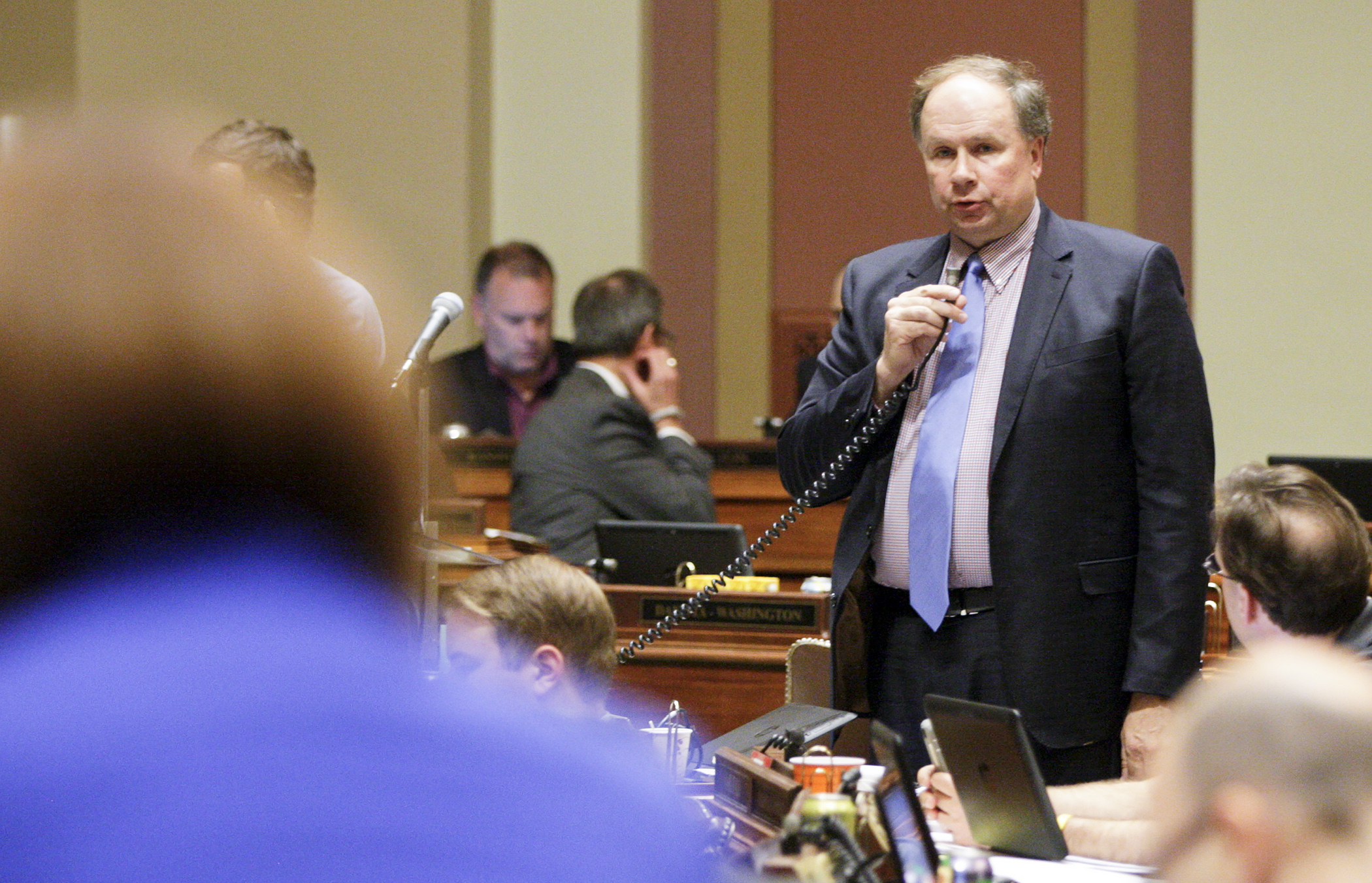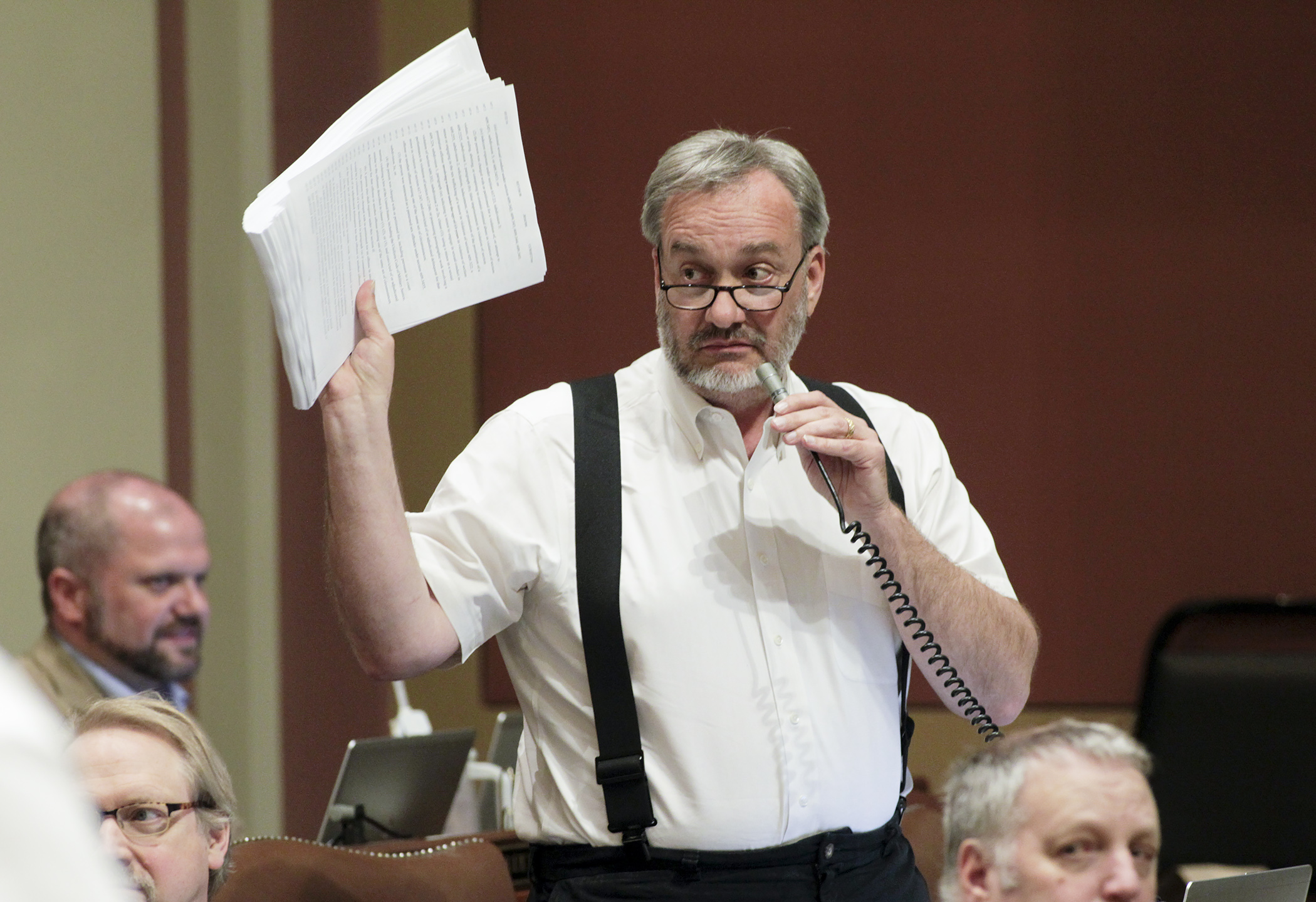House, Senate pass $182 million supplemental budget headed to governor

Although few members had read all of the 599 pages of the supplemental budget bill before it appeared on the House Floor Sunday, the bill was passed 95-39 with just over an hour left in the 2016 legislative session.
HF2749, sponsored by Rep. Jim Knoblach (R-St. Cloud) and Sen. Richard Cohen (DFL-St. Paul), was then passed 50-16 by the Senate. It now goes to the governor.
“Members, there’s a lot of great things in this bill, please vote ‘yes,’ let’s get ‘er done,” Knoblach said.
After meeting nearly around the clock over the weekend, the bills’ conference committee Sunday morning approved an overall bottom line of $182 million in supplemental spending for the biennium. The House had previously proposed just $3.2 million in supplemental spending, compared to the Senate’s $454.8 million.
Along with myriad policy and technical changes, the bill would provide funding for a wide range of programs, including $25 million for prekindergarten, $35 million for broadband expansion and $35 million for equity programs – all of which were priorities for Gov. Mark Dayton.
Although some additional spending is offset by additional revenue, the overall budget impact of the proposal, by funding area, as reported by House fiscal staff is:
- Jobs, Energy and Equity: $75 million, including $35 million for broadband and $35 million for equity;
- State Government: $45.23 million;
- E-12 Education: $25 million;
- Public Safety: $24.97 million;
- Environment and Agriculture: $7.18 million;
- Higher Education: $5 million; and
- Health and Human Services: $0.
DFLers criticized the last-minute presentation of the bill.
With less than three hours to go, Rep. Rick Hansen (DFL-South St. Paul) said he was just over 100 pages into the bill looking for “surprises” and asked if anyone else had read the whole thing. The member who seemed to be the farthest along was Rep. Melissa Hortman (DFL-Brooklyn Park), who was on page 128.
“Last year I got 60 seconds to read your bill; this year I get three-and-a-half hours to read your bill,” said Rep. Tim Mahoney (DFL-St. Paul). “It’s an improvement.”
“We’ve been meeting in public for two weeks on this conference committee,” Knoblach said. Minority caucus members spoke at length about various shortcomings of the bill, saying more funding was needed for broadband, funding for higher education tuition freezes and cybersecurity, among other things.
“One of the themes of this bill, members, is great expectations that have been crushed,” said House Minority Leader Paul Thissen (DFL-Mpls).
 Rep. Rick Hansen holds a copy of the omnibus supplemental spending bill during debate May 22. Photo by Paul Battaglia
Rep. Rick Hansen holds a copy of the omnibus supplemental spending bill during debate May 22. Photo by Paul BattagliaErik Simonson (DFL-Duluth) took issue with a provision in the broadband area that would limit $5 million of the $35 million to be used in “unserved” areas in Greater Minnesota, the people he said are most in need.
“You’ve capped it at $5 million … to cities and town across Minnesota that were screaming for it,” he said.
Rep. Jenifer Loon (R-Eden Prairie) defended the bill against assertions that it didn’t do enough for education at various levels, saying this Legislature and House education committees had been “more dedicated than ever” in providing funding for early learning and other education programs.
WATCH House Floor debate on the bill on YouTube
Rep. Peggy Flanagan (DFL-St. Louis Park) praised the bill for intentionally addressing racial disparities in the state and suggested including “disparities indicators” in future legislation.
“The face of Minnesota is changing and we need to keep up with that change,” she said.
Tax provisions
The bill also includes four tax provisions, which Knoblach said would have no cost in the current biennium but would cost $39 million in Fiscal Year 2018 and $29 million in Fiscal Year 2019. The provisions would:
- provide a one-year extension for the angel investment tax credit;
- exempt military pensions from state tax;
- provide a $2,000 tax credit for families who have a stillborn baby; and
- eliminate sales tax for modular homes.
Rep. Tina Liebling (DFL-Rochester) said she was troubled by seeing additional tax provisions outside of the omnibus tax bill that was passed by the House Sunday morning.
Knoblach admitted it was “unusual,” but said it had been done at least once in the past and the provisions had been heard in the House Taxes Committee.
“We had a tax bill, these could have gone in the tax bill,” Liebling said. “This is another example of entirely inventing the rules as we go along. … It’s certainly a violation of the expectations of members of the House and there’s no explanation of it.”
Related Articles
Search Session Daily
Advanced Search OptionsPriority Dailies
Speaker Emerita Melissa Hortman, husband killed in attack
By HPIS Staff House Speaker Emerita Melissa Hortman (DFL-Brooklyn Park) and her husband, Mark, were fatally shot in their home early Saturday morning.
Gov. Tim Walz announced the news dur...
House Speaker Emerita Melissa Hortman (DFL-Brooklyn Park) and her husband, Mark, were fatally shot in their home early Saturday morning.
Gov. Tim Walz announced the news dur...
Lawmakers deliver budget bills to governor's desk in one-day special session
By Mike Cook About that talk of needing all 21 hours left in a legislative day to complete a special session?
House members were more than up to the challenge Monday. Beginning at 10 a.m...
About that talk of needing all 21 hours left in a legislative day to complete a special session?
House members were more than up to the challenge Monday. Beginning at 10 a.m...